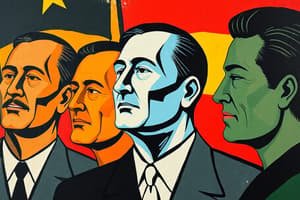Podcast
Questions and Answers
What is the definition of political culture?
What is the definition of political culture?
The characteristic values, beliefs, and behaviors of a society's members in regard to politics.
What is the best description of the left wing?
What is the best description of the left wing?
- Individualist
- Liberal
- Collectivist (correct)
- Conservative
What are some key principles of classical socialism?
What are some key principles of classical socialism?
- State control of the economy (correct)
- Free market capitalism
- Equality of opportunity
- Limited government intervention
What is egalitarianism?
What is egalitarianism?
What are some key principles of modern conservatism?
What are some key principles of modern conservatism?
Who were the Loyalists?
Who were the Loyalists?
What is communitarianism?
What is communitarianism?
What are some key principles of conservatism?
What are some key principles of conservatism?
What does Seymour Martin Lipset argue in his book "Revolution and Counter-revolution"?
What does Seymour Martin Lipset argue in his book "Revolution and Counter-revolution"?
What are the labels 'right', 'left', and 'centre' used to signify?
What are the labels 'right', 'left', and 'centre' used to signify?
What is Loyalism?
What is Loyalism?
What is post-materialism?
What is post-materialism?
What is false consciousness?
What is false consciousness?
What is the fragment theory?
What is the fragment theory?
What are path dependency models?
What are path dependency models?
What is red Toryism?
What is red Toryism?
What is an ideology?
What is an ideology?
What is multiculturalism?
What is multiculturalism?
What is the "end of ideology" thesis?
What is the "end of ideology" thesis?
Flashcards
Political Culture
Political Culture
Characteristic values, beliefs, and behaviors regarding politics in a society.
Left Wing
Left Wing
A political stance characterized by collectivist ideals.
Classical Socialism
Classical Socialism
An ideology promoting equality of condition and state intervention in the economy.
Egalitarianism
Egalitarianism
Signup and view all the flashcards
Modern Conservatism
Modern Conservatism
Signup and view all the flashcards
Loyalists
Loyalists
Signup and view all the flashcards
Communitarianism
Communitarianism
Signup and view all the flashcards
Conservatism
Conservatism
Signup and view all the flashcards
Revolutionary Origins
Revolutionary Origins
Signup and view all the flashcards
Ideological Spectrum
Ideological Spectrum
Signup and view all the flashcards
Loyalism
Loyalism
Signup and view all the flashcards
Post-materialism
Post-materialism
Signup and view all the flashcards
False Consciousness
False Consciousness
Signup and view all the flashcards
Liberalism
Liberalism
Signup and view all the flashcards
Materialism
Materialism
Signup and view all the flashcards
Fragment Theory
Fragment Theory
Signup and view all the flashcards
Libertarianism
Libertarianism
Signup and view all the flashcards
Path Dependency Models
Path Dependency Models
Signup and view all the flashcards
Red Toryism
Red Toryism
Signup and view all the flashcards
Ideology
Ideology
Signup and view all the flashcards
Socialism
Socialism
Signup and view all the flashcards
Multiculturalism
Multiculturalism
Signup and view all the flashcards
End of Ideology
End of Ideology
Signup and view all the flashcards
Study Notes
Political Culture
- A society's shared values, beliefs, and behaviors about politics.
Left Wing Ideology
- Characterized by collectivism.
Classical Socialism
- Emphasizes equality of condition.
- Advocates state control of the economy.
- Seeks improved working conditions.
- Promotes public healthcare.
- Supports unemployment insurance.
Egalitarianism
- The belief in the equality of all people.
Modern Conservatism
- Prioritizes equality of opportunity.
- Focuses on protecting individual freedoms over minority rights.
Loyalists
- Individuals who supported the British crown during the American Revolution.
- Left the US after the revolution.
Communitarianism
- An ideology prioritizing communal relations.
- Values public recognition of group identities and equal respect among diverse groups.
Conservatism
- Historically focused on tradition and human inequality.
- Today, associated with:
- Defense of private property and free trade.
- Individualism.
- Opposition to the welfare state.
- Social conservatism emphasizing traditional values, religion, and family.
Revolutionary and Counter-Revolutionary Origins
- American political development impacted by the American Revolution of 1776.
- U.S. values are rooted in revolutionary liberal ideas.
- Canada's political history leans towards rejecting revolutionary ideals and prioritizing state authority.
Right, Left, and Centre
- Ideological spectrum ranging from collectivism (left) to individualism (right).
- Center ground encompasses elements from both extremes.
Loyalism
- Associated with those opposing the American Revolution.
- Characterized by loyalty to the British crown and rejection of American identity.
Post-Materialism
- Emphasizes personal fulfillment, belonging, and self-esteem.
- Prioritizes quality-of-life issues like environment, equality, and human rights.
False Consciousness
- Marxist concept.
- Subordinate classes fail to recognize their true interests.
- Acceptance of beliefs that justify their exploitation.
Liberalism
- Historically emphasizes:
- Religious freedom.
- Free enterprise and trade.
- Political expression and association.
- Later evolved to include welfare state support, minority rights protection, and business regulation.
Materialism
- Stresses economic security and material well-being.
- Prioritizes income and employment above human rights or environmental protection.
Fragment Theory
- Historical analysis of New World societies.
- Emphasizes the influence of early immigrants on societal development in Canada.
Libertarianism
- Advocates maximum individual freedom in all spheres of life.
- Often aligns with left-leaning views on lifestyle and morality.
Path Dependency Models
- Analytical frameworks highlighting the effects of prior events and choices on current situations.
Red Toryism
- Canadian conservative ideology.
- Believes in government responsibility for the collective good, extending beyond law enforcement.
- Supports public enterprises for cultural and economic goals and Canadian nationalism.
Ideology
- A system of interconnected beliefs about societal structure and function.
Socialism
- Based on equality of condition.
- Historically emphasized greater state economic management, worker rights, and egalitarian policies.
- Modern socialists/social democrats often temper this with market acceptance.
Multiculturalism
- Values ethnic and cultural identities.
- Public policy supports the retention of identities and traditions.
- Official policy in Canada since 1971.
"End of Ideology"
- Thesis arguing that traditional ideological divides have become obsolete.
- Consensus on welfare state, government regulation, and political pluralism.
Studying That Suits You
Use AI to generate personalized quizzes and flashcards to suit your learning preferences.





